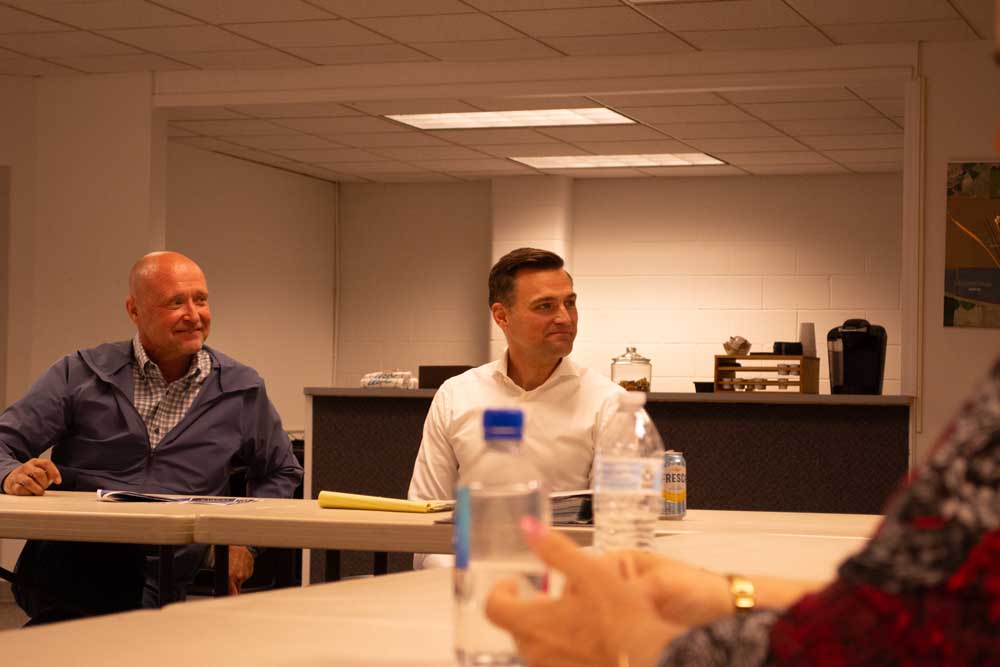Capital Chatter: How did 300 non-citizens get registered to vote in Oregon?
Published 4:30 pm Thursday, September 19, 2024

- capital chatter logo
House Republicans want Oregon officials to tell legislators how more than 300 non-citizens became registered voters.
Trending
It’s a reasonable request. Oregon’s squeaky-clean election image is more than cracked. It’s shattered, despite the small numbers involved.
But don’t count on such a hearing actually taking place when lawmakers gather in Salem next week for three days of committee meetings. Democrats, who control the Oregon Legislature, are wary of handing Republicans such a big soapbox to bash Democrats and their policies during this tense election season.
Democratic lawmakers, their allies and Oregon DMV officials had said House Bill 2015, passed late in the 2019 legislative session on near-party-line votes, would not lead to undocumented immigrants being registered as voters.
They were wrong.
House Republican Leader Jeff Helfrich, of Hood River, on Monday called for the House Rules Committee “to receive a briefing from the Secretary of State and the director of the Oregon Department of Transportation on what is being done to catch and purge noncitizens from Oregon’s voter rolls.”
House Majority Leader Ben Bowman, D-Tigard, chairs the Rules Committee, which typically handles election issues. The DMV is a division within ODOT.
Trending
As of Thursday morning, Helfrich had received no response to his request. I checked.
Spokespeople for Bowman and House Speaker Julie Fahey, D-Eugene, told me the leaders were aware of Helfrich’s request: “It is under consideration.”
A few hours later, Helfrich reiterated his request.
There is little doubt that some D’s and R’s in the Legislature will employ electioneering next week to create campaign fodder and cast partisan opponents in an unfavorable light. Bowman and the Democrats would be smart to take the high road and hold an informational hearing anyway.
The fact that non-citizens were registered as voters, apparently through clerical errors in Oregon’s “motor voter” registration system, shows that opponents’ fears were justified.
This is a statewide issue. For example, a dozen non-citizens were registered as Deschutes County voters, two in Jefferson County but none in Crook County — so far.
It’s disingenuous to minimize the numbers and impact. Senate Republican Leader Daniel Bonham, of The Dalles, explained why in a letter to Gov. Tina Kotek: “I fear it could be just the tip of the iceberg. If such errors are occurring, it calls into question the accuracy of our voter rolls and the security of our elections.”
At least two of the non-citizen voters cast ballots. It might be many more who voted — and certainly more than the 306 discovered so far to be wrongly registered voters. A state audit is not finished.
Secretary of State LaVonne Griffin-Valade and her fellow Democrats have emphasized election integrity. A Monday press release from Griffin-Valade, promoting National Voter Registration Day, concluded with these words: “The 2024 elections will be the most secure elections in history. Learn all the ways we protect your vote at gov/Integrity.”
Yet Oregon officials apparently were unaware of the illegal registrations until the Institute for Responsive Government inquired about the DMV processes. That development calls into question Kotek’s recent statement in which she said, “The error in data entry which may have affected the voter eligibility of some Oregonian’s [sic] voter registration was discovered because the Oregon DMV and the Secretary of State were doing their due diligence ahead of the 2024 election.”
Kotek, Fahey and Senate President Rob Wagner, D-Lake Oswego, are under scrutiny as the potentially contentious 2025 legislative session approaches. The non-citizen voter fiasco is a prime opportunity for them to demonstrate bipartisan leadership, which they espouse, and hold themselves and state agencies accountable.
Bowman was not yet in the Legislature but then-Speaker Kotek, Fahey and Wagner voted for HB 2015, which allowed Oregonians to obtain a noncommercial driver license, permit or ID card without proving legal residence. That well-intentioned law apparently opened the door for clerical mistakes.
“We identified a possible, though rare, cause for error: staff inadvertently selecting ‘U.S. passport’ or ‘U.S. birth certificate’ when an individual presented a document from a foreign nation. Incorrect coding of these individuals as citizens resulted in them being included in the file DMV sends to the Elections Division for the next step in the voter registration process,” Kevin Glenn, ODOT communications director, said.
“We have already put in place two mitigations. First, we’ve added a prompt during the data entry phase for staff to double check for accuracy. Second, we are performing nightly reviews on reports of all such transactions and comparing the document entered to the coding in the system.
“We believed the processes we put in place were effective. We did find a rare but important anomaly that we have now corrected.”
This is yet another illustration of Murphy’s law — “Anything that can go wrong will go wrong” — and why the opposing side’s concerns should not be discounted amid the political debate.
Bear in mind that the best way for politicians to overcome bad publicity is by patiently answering every question from journalists, taking responsibility and revealing every possible iota of information instead of trying to control the news. I find it stunning that the governor, secretary of state and ODOT have not held an extensive held press to do so.
Responding to Helfrich would be good, too. And courteous.
Side note: “Oregon DMV” stands for Oregon Driver and Motor Vehicle Services division — not Oregon Department of Motor Vehicles. The clunky name was created years ago to fit the DMV acronym while recognizing that the agency was not an independent department. When politicians and other public officials can’t get the name right, it seems logical to wonder what else they’re getting wrong.





